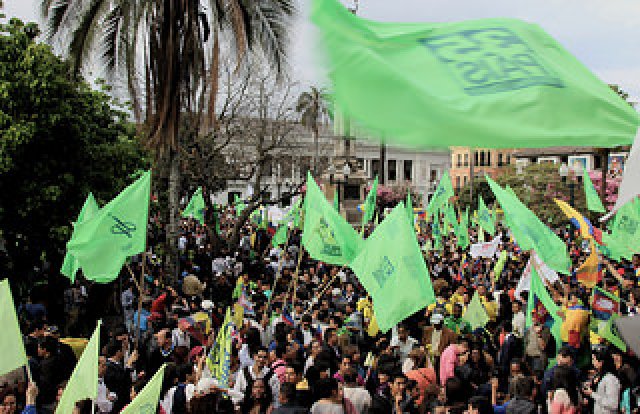
President Rafael Correa called a rally on July 2 in defence of democracy and the pro-poor Citizens' Revolution his government leads after plans by the right-wing opposition for a violent coup were exposed.
“We are ready to defend the revolution against the coup plotters,” Correa told thousands of supporters gathered outside the Presidential Palace on the evening of July 2.
“We will remain firm in defending the revolution against the ultra-right.” he added.
Correa referred to the ongoing support for the political project that he leads, known as the Citizens' Revolution, and recent right-wing demonstrations seeking his ousting. He said: “We are many, we are many more”.
Correa said that if the right-wing opposition wanted change, it should seek it through the ballot box. Rather, he said, they “are using the technique of permanent mobilisations to tire us out … to prevent us from governing”.
Insisting nobody was going to tire, the president said: “We are willing to defend our history and our citizens' revolution … here we have democracy, here the majority rule and the past will never return.”
Correa condemned opposition violence and manipulation by the private media support of those demanding his ousting. He said opposition sectors had planned to violently seize the presidential palace.
On July 1, the Ecuadorian government denounced opposition plans to overthrow the government during protests scheduled for the next day. As well as seizing the presidential palace, the plans included a blockade of the airports of Quito and Guayaquil, and the bridges located on the Colombian and Peruvian borders.
Interior minister Jose Serrano revealed to the press a conversation between opposition leader Andres Paez and ex-head of military intelligence Mario Pazmino, detailing the violent plans to overthrow the government.
Serrano read a transcript of the conversation, and said: “[The opposition] will take the Carondelet Palace by force. [The opposition] will bring people together and position them at various entrances to Independence Plaza. They will break with force, break with force, police barricades.”
In the recording, Paez and Pazmino discussed organising a caravan to the airport for July 5 to block Pope Francis from entering the country, as well as blocking the Peruvian and Colombian borders during the papal visit. They said their objective was to try to create enough chaos to deter the Pope's visit.
In recent weeks, a wave of opposition protests have increasingly turned violent. Initially called to oppose planned new taxes on the wealthy, many are demanding the ouster of Correa — who won 2013 elections with more than 57% of the vote.
In response to the protests, Correa announced on June 15 plans to temporarily withdraw the tax laws in order to start a national debate on wealth redistribution.
The opposition has officially boycotted Correa's call for dialogue. But grassroots groups across the country have begun organising assemblies and meetings to debate government plans and raise their own proposals.
The Citizens' Revolution, begun when Correa first became president in 2007, has brought about a series of social programs and reforms. These have delivered remarkable changes for Ecuador's long-excluded majority.
The reforms have positioned the country as one of the most stable economies in Latin America, after decades of turmoil. Government policies have taken an estimated 1.1 million people out of poverty, according to official figures.
[Compiled from TeleSUR English.]
Like the article? Subscribe to Green Left now! You can also like us on Facebook and follow us on Twitter.